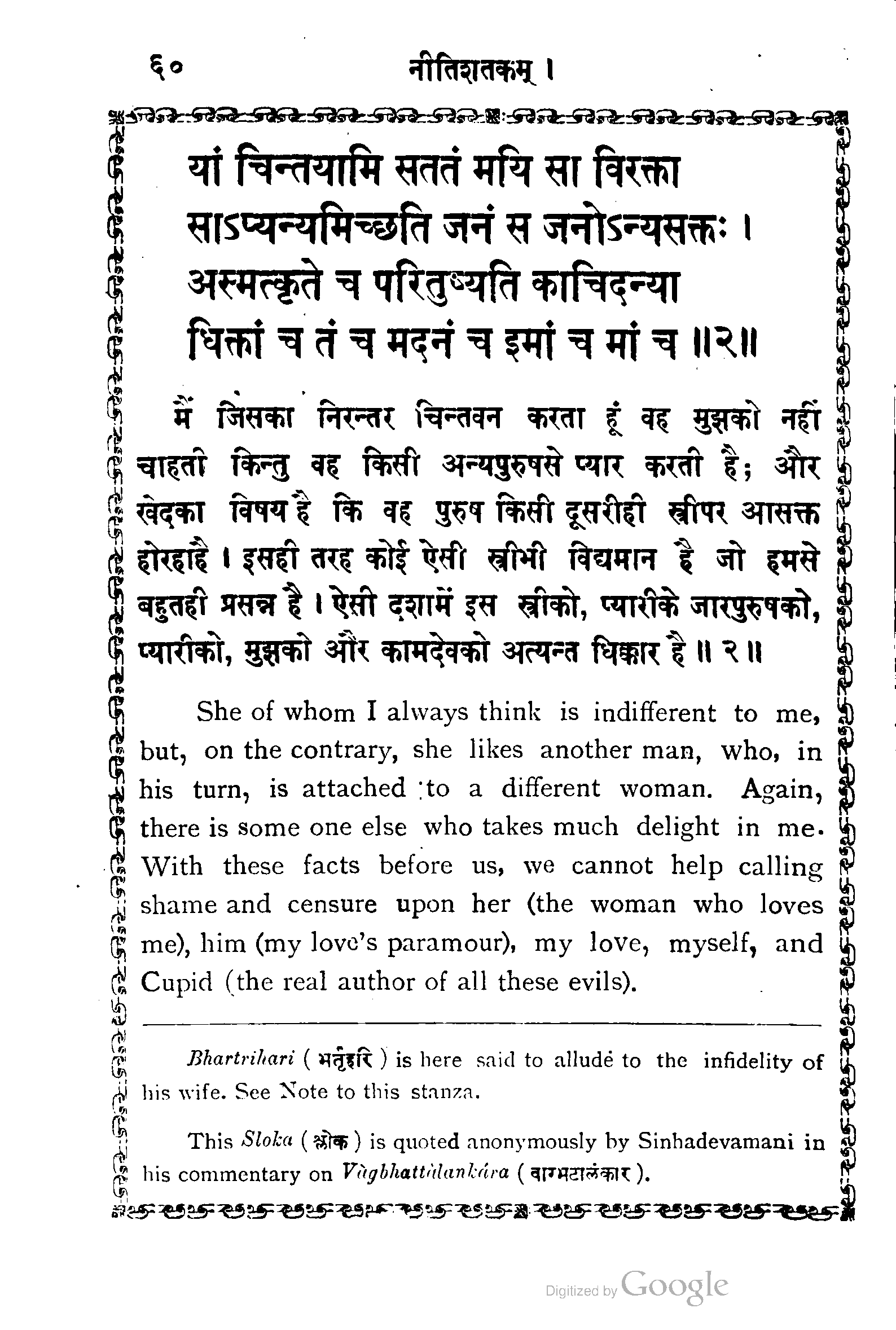Ryder
Brough
Tawney
More
Telang
verse

Text (not proofread)
यां चिन्तयामि सततं मयि सा विरक्ता
साप्यन्यमिच्छति जनं स जनोग्यसक्तः ।
अस्मत्कृते च परितुष्यति काचिदन्या
धिक्तां च तं च मदनं च इमां च मांश्च ॥ २ ॥
footnote

Text (not proofread)
II . ( a ) ( वे ० ; न P. R. ( 6 ) ° प्य ° ; चा ०. Bo . Be . P. B. सतः ; रक्तः
Be.n. ( c ) च ; पि . P. R. Be.n , Bo.n. ० तु ° ० ; शु . ० X. ( d ) भिक्तां च
तंच ; वित्तं च तोच . W.
endnote


Text (not proofread)
St. II . The commentator relates the following anecdote on
this Stanza . Once upon a time , king Vikrama happened to come
into possession of a certain fruit which rendered immortal any
one who ato it . Vikrama gave it to a Brahmin , the Brahmin
to " king Bhartrihari , the protector of many people . " Bhartri
hari gave it to his wife , she to her paramour ; and he in his
turn to a sweetheart of his , in whose hands Bhartrihari saw the
fruit . That was the occurrence which inspired this Stanza . The
other commentator Râmarshi makes no mention of Vikrama in
this connexion , but represents a Brahmin as giving the fruit to
Bhartrihari , he to his wife , and so forth . His noticeable ;
it is equivalent to महिपयकविरागवती being an instance of the वैषयि
K¶¶¶ ( Siddh . Kaym . Târân . Ed . I. 307 ) . renhà ricgrua is not
quite clear . The commentator says मदर्थेपि काचन स्त्री मया सह सङ्गी
vẫav gâ nafa da aff . Râmarshi ( V. S. 105 ) says T
स्कृतपि अस्मदर्थेवि परितुष्यात समानन्दति अस्माखेव अनुरक्ता भस्मानेव अभिलपतीत्यर्थः .
But these explanations are hardly satisfactory . As it stands , it
perhaps may be taken to mean " is delighted with all I do . " But
the reading of X. is very much better . The hiatus at is
worthy of note . Grammatically not incorrect , ( see Siddh . Kaun .
II . 22 ) it is disapproved of by writers on Rhetoric . See Kavya
dars'a ( Bibl . Ind . Ed . ) p . 430 and Kavya Prakas'a 155. - Vu
santatilaká ..
Telang
verse


Text (not proofread)
यां चिन्तयामि सततं मयि सा न रक्ता
साचान्यमिच्छति जनं स जनोन्यसक्तः ।
अस्मत्कृतोप परितुष्यति काचिदन्या
धिक्तां च तं च मदनं च इमां च मां च ॥ ३६ ॥
Kosambi
verse

Text (not proofread)
यां चिन्तयामि सततं मयि सा विरक्ता
साप्यन्यमिच्छति जनं स जनोऽन्यसक्तः ।
अस्मत्कृते च परितुष्यति काचिदन्या
घिकू तां च तं च मदनं च इमां च मां च ॥ ३११ ॥
footnote

Text (not proofread)
311 { N , V } Found generally in N , but om . in Wai 2. Ao fol . missing .
Om in S ( but N2 in W and Y1 ) . F1 V3 ; F3 N1 , V105 ; F4V1 ; Jodhpur3 V1 ,
N1 ; BORI 326N2 , V101 ( 100 ) . – V 4 ) C [ अ ] नुदिनं ( for सततं ) . F Figs ... ( Vai )
H1.2.3c न न रक्ता ( for विरक्ता ) . – 6 ) F3 ( Niti ) . 6 H1 . 2 , 30 सा चान्यम् . C नरं : Y1 जनः
( for जनं ) . C स नरो ; Y1B स्वजनो ( for स जनो ) . c ) F3 ( Vai ) तत्कारणाय ( for
अस्मत्कृते च ) . A3 Y1B तु ; B2 ( by corr . ) F2 H1.2.30 I [ 5 ] पि ( for च ) . Eo.1 F
( Vai ) परिशुष्यति ; Fi.m.v. परिखिद्यति . d ) A3 B1 मदनं धिगिमां च मां च ; C मदनं च
कुसुमेइषुमिमां च मां च ; 12 मदनं च हि मां त्विमां च .
BIS . 5438 ( 2461 ) Bhartṛ . ed . Bohl , lith , ed . II and Galan 2. 2. Haeb . and
lith . ed . I. 1. Vet in LA ( III ) 25. Simhāsanadvā . ( after Gildemeister ) . Subhash .
302. SK Dr. under विरक्ता ; VS. 566 ( Bh . ) ; SU . 1005 ( Bh . ) ; SL f 18a ; com . of
Simhadevagani on Vāgbhatālahkāra 1 17 ( KM . 48. p . 13 ) .



